Commissioners
Since Incorporation on June 6th,1969, Commissioners of the O.P.P. have been made Honorary Presidents of the Ontario Provincial Police Veterans' Association during their terms of service, and Life Members of the Association after they retire or leave the force.
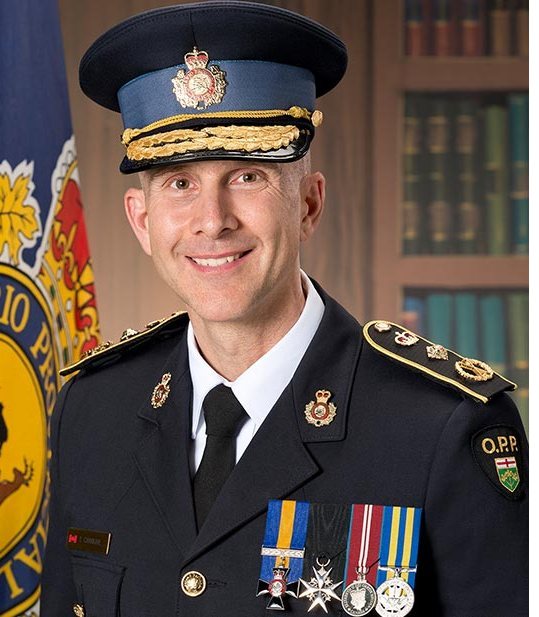
Thomas Carrique
became the 15th Commissioner of the Ontario Provincial Police on April 8, 2019. Commissioner Carrique commenced his policing career with York Regional Police in 1990. He progressed through the ranks and was promoted to Deputy Chief. He has worked in a variety of roles with York Regional Police, including Uniform Patrol, Criminal Investigations, Investigative Services, Traffic, Marine, Public Order, and as the Deputy Chief of the Administration Branch, the Operations Branch and Investigations and Support Branch.
Before joining the York Regional Police Executive Command Team as the Deputy Chief of Administration in 2011, Commissioner Carrique served as Superintendent-in-Charge of Staff Services. He also served as the Officer-in-Charge of the Organized Crime Bureau, and as Special Investigation Unit liaison officer.
Commissioner Carrique holds a Master's degree in leadership and training, with a specialty in justice and public safety, from Royal Roads University and a certificate in terrorism studies from the University of St. Andrews in Scotland. He is a graduate of the National Policing Improvement Agency's International Commanders Program in the United Kingdom and the United States Department of Justice Drug Unit Commanders Academy. He is currently a co-chair of the Canadian Association of Chiefs of Police Organized Crime Committee and the First Vice-Chair of the Criminal Intelligence Service Ontario executive body.
Commissioner Carrique has received the Police Exemplary Service Medal, the Queen Elizabeth II Diamond Jubilee Medal and, in 2013 he was appointed as a Member of the Order of Merit of the Police Forces. Commissioner Carrique is also a Serving Brother of the Order and present Chair of St. John Ambulance - York Region Branch.
Before joining the York Regional Police Executive Command Team as the Deputy Chief of Administration in 2011, Commissioner Carrique served as Superintendent-in-Charge of Staff Services. He also served as the Officer-in-Charge of the Organized Crime Bureau, and as Special Investigation Unit liaison officer.
Commissioner Carrique holds a Master's degree in leadership and training, with a specialty in justice and public safety, from Royal Roads University and a certificate in terrorism studies from the University of St. Andrews in Scotland. He is a graduate of the National Policing Improvement Agency's International Commanders Program in the United Kingdom and the United States Department of Justice Drug Unit Commanders Academy. He is currently a co-chair of the Canadian Association of Chiefs of Police Organized Crime Committee and the First Vice-Chair of the Criminal Intelligence Service Ontario executive body.
Commissioner Carrique has received the Police Exemplary Service Medal, the Queen Elizabeth II Diamond Jubilee Medal and, in 2013 he was appointed as a Member of the Order of Merit of the Police Forces. Commissioner Carrique is also a Serving Brother of the Order and present Chair of St. John Ambulance - York Region Branch.
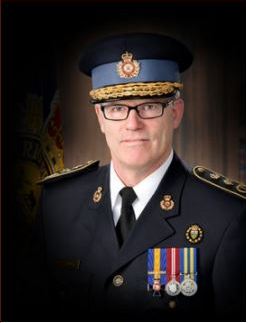
J.V.N. (VINCE) HAWKES
became Commissioner of the Ontario Provincial Police (OPP) on March 29, 2014, assuming leadership of one of North America's largest deployed police services. Commissioner Hawkes oversees front-line policing, traffic and marine operations, emergency response and specialized and multi-jurisdictional investigations throughout the Province of Ontario.
Since joining the OPP in 1984, Commissioner Hawkes has amassed an array of operational policing experience, particularly in front-line service delivery, investigative disciplines and forensic science. From 2006 until his appointment as Commissioner, Hawkes has served as Deputy Commissioner of Investigations and Organized Crime and, most recently, Field Operations.
Hawkes' cross-command experience is extensive, including tenures as Commander of the Communications and Technology Services Bureau; Detachment Commander; Regional Criminal Operations Manager and Staff Development/Training Manager. Commissioner Hawkes spent 11 years as a Forensic Specialist and was the first OPP member to be certified as a Bloodstain Pattern Analyst.
He is a graduate of both the University of Ottawa with a Baccalaureate in Science and the University of Toronto Rotman School of Management, Police Leadership Program. Commissioner Hawkes is also a graduate of the international Leadership in Counter Terrorism program.
Commissioner Hawkes is the Past Chair for the Canadian Integrated Response to Organized Crime, a multi-service partnership. He is a member of the International Association of Chiefs of Police and a Director with both the Canadian Association of Chiefs of Police and the Ontario Association of Chiefs of Police. Commissioner Hawkes is also the past Campaign Cabinet Co-chair of the United Way Greater Simcoe County. Since May 2010, Commissioner Hawkes has been invested as an officer in the Order of Merit of the Police Forces, a fellowship of honour that recognizes exemplary police service.
Since joining the OPP in 1984, Commissioner Hawkes has amassed an array of operational policing experience, particularly in front-line service delivery, investigative disciplines and forensic science. From 2006 until his appointment as Commissioner, Hawkes has served as Deputy Commissioner of Investigations and Organized Crime and, most recently, Field Operations.
Hawkes' cross-command experience is extensive, including tenures as Commander of the Communications and Technology Services Bureau; Detachment Commander; Regional Criminal Operations Manager and Staff Development/Training Manager. Commissioner Hawkes spent 11 years as a Forensic Specialist and was the first OPP member to be certified as a Bloodstain Pattern Analyst.
He is a graduate of both the University of Ottawa with a Baccalaureate in Science and the University of Toronto Rotman School of Management, Police Leadership Program. Commissioner Hawkes is also a graduate of the international Leadership in Counter Terrorism program.
Commissioner Hawkes is the Past Chair for the Canadian Integrated Response to Organized Crime, a multi-service partnership. He is a member of the International Association of Chiefs of Police and a Director with both the Canadian Association of Chiefs of Police and the Ontario Association of Chiefs of Police. Commissioner Hawkes is also the past Campaign Cabinet Co-chair of the United Way Greater Simcoe County. Since May 2010, Commissioner Hawkes has been invested as an officer in the Order of Merit of the Police Forces, a fellowship of honour that recognizes exemplary police service.
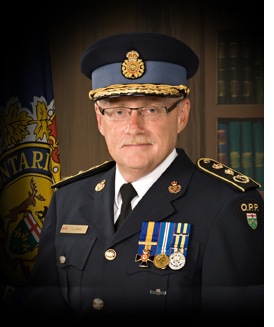
Chris D. Lewis
became Commissioner of the Ontario Provincial Police (OPP) on August 1, 2010, assuming leadership of one of North America's largest deployed police services. Commissioner Lewis oversees front-line policing, traffic and marine operations, emergency response and specialized and multi-jurisdictional investigationsthroughout the Province of Ontario.
Since joining the OPP in 1978, Commissioner Lewis has amassed a wealth of operational policing experience, particularly in front-line service delivery, various investigative disciplines and tactical operations. From 2007 until his appointment as Commissioner, Lewis served as Deputy Commissioner of Field Operations.
Lewis's cross-command experience is wide and varied, including tenures as Commander of the Investigation Bureau; the Information Technologies Bureau; and the Emergency Management Bureau; as well as the Director of the Criminal Intelligence Service Ontario at the then Ministry of Solicitor General. He was Regional Commander of the OPP's East Region; served as Director of the Criminal Investigation Branch and worked with the Royal Canadian Mounted Police to establish and lead the Cornwall Regional Task Force.
Commissioner Lewis, an Officer of the Order of Merit of the Police Forces, is a graduate of the FBI's National Academy Program. He is a strong advocate for community-based initiatives, including the United Way and the Ontario Law Enforcement Torch Run for the Special Olympics.
Since joining the OPP in 1978, Commissioner Lewis has amassed a wealth of operational policing experience, particularly in front-line service delivery, various investigative disciplines and tactical operations. From 2007 until his appointment as Commissioner, Lewis served as Deputy Commissioner of Field Operations.
Lewis's cross-command experience is wide and varied, including tenures as Commander of the Investigation Bureau; the Information Technologies Bureau; and the Emergency Management Bureau; as well as the Director of the Criminal Intelligence Service Ontario at the then Ministry of Solicitor General. He was Regional Commander of the OPP's East Region; served as Director of the Criminal Investigation Branch and worked with the Royal Canadian Mounted Police to establish and lead the Cornwall Regional Task Force.
Commissioner Lewis, an Officer of the Order of Merit of the Police Forces, is a graduate of the FBI's National Academy Program. He is a strong advocate for community-based initiatives, including the United Way and the Ontario Law Enforcement Torch Run for the Special Olympics.
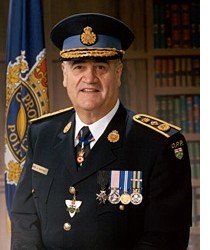
Julian Fantino
was appointed Commissioner of the Ontario Provincial Police (OPP) on October 30, 2006, and accepted responsibility for one of North America's largest deployed police services -- a police service comprised of over 5,500 uniformed members, 2,000 civilian employees and 850 Auxiliary members who provide services to over 922,752 square kilometres of land and 110,398 square kilometres of waterways. Commissioner Fantino oversees front-line delivery, administrative support services and specialized and multi-jurisdictional investigations throughout the Province of Ontario. In March 2005, Julian Fantino accepted the role of Commissioner for Emergency Management, and was responsible for providing leadership to all facets of the government's emergency management programs, including the provision of expert advice and guidance to the Premier and Cabinet on policy, procedures and legislation for provincial emergencies and other crises. Commissioner Fantino was appointed Chief of the Toronto Police Service in 2000. Toronto has one of the largest municipal police services in North America, responsible for policing a city of almost 2.5 million people.Commissioner Fantino was the Chief of York Regional Police from 1998 to 2000. During that time, he led a number of progressive changes and initiatives to ensure optimum officer and public safety through enhanced resources and training. He was also the Chief of the London Police Service from 1991 to 1998. During his tenure, significant changes took place, including formation of an Emergency Response Unit and a Public Order Unit, opening a Police Reporting Centre and development of numerous community partnerships. During his 23 years with the Metropolitan Toronto Police, Commissioner Fantino served in many areas, including uniform patrol, undercover drug enforcement, Detective Branch, Criminal Intelligence, Homicide Squad and as a Division Commander. Commissioner Fantino has lectured extensively to the police community, the public sector and government bodies in Canada and the United States. He is the Past President of the Ontario Association of Chiefs of Police and Past Chair of the Canadian Association of Chiefs of Police Organized Crime Committee. Commissioner Fantino is also past Vice President at Large of the International Association of Chiefs of Police and was a member of the Major Cities Chiefs.
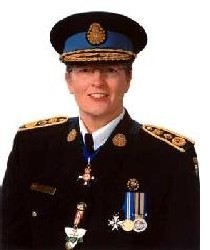
Gwen Boniface
was the first female commissioner of the OPP appointed in 1998, the first female Canadian Association of Chiefs of Police president, and the first external officer invited to become a member of the National Association of First Nations Chiefs of police. "I was honoured in a number of ways by the First Nations Police Services as well as by their national association. I have always been very pleased to have been there at a point in time where it was just starting to develop and I have actually had the joy of watching it grow over the years." The OPP also made progress on diversity under Boniface. She says, "Significant dialogue took place -- good, strong organizations are prepared to have those dialogues. I am very pleased about the effort and work we did on diversity." Commissioner Boniface had several major issues to face during her eight years in the role. She was commissioner during the arrival of the millennium year, the ice storm, 9/11, the blackout, as well as the Ipperwash Inquiry. Like many, she recalls exactly where she was when she was notified about 9/11. "It is so ingrained in my mind. I was on vacation at our cottage and the phone rang. It was my executive officer and he told me what was going on. We hadn't even turned on the TV yet and we flipped it on and all of a sudden within hours I was at GHQ and stayed for most of the night. We didn't really lift our heads until Christmas. There was something every year. I look back and wonder when there was breathing time and I don't know when it was in that eight years. We had a lot of major operational issues in that time frame and the members pulled those off remarkably well and very professionally." Retired Commissioner Boniface admits to being human. "I always said that you can only be who you are. Your own personal instincts kick in and you do what you have to do. I always felt very strongly that it was very important to do that in a very human way and I hope I accomplished that."
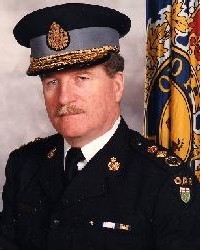
Thomas O'Grady
was appointed Commissioner of the OPP in 1988. He led the OPP for ten years and during a time of vast change. "Our public was becoming more and more diverse and I think we began to move in that direction and we are moving in that direction still. The police must be representative of the public we serve." He goes on to say that diversity includes gender diversity. "To meet the challenge, the OPP has to be well staffed with female officers and during my time as commissioner, women started to come into their own. Of course, as I left, a female commissioner took the job, and I would like to think that I had some impact moving that along. We need the services of women to address the issues of the population." Commissioner O'Grady is also very proud of the role he played in the move of OPP General Headquarters to Orillia from Toronto. "I was very strongly supportive of the new building. I thought, we are not the Toronto Police Service, we are for the province and we would be better located in an area detached from Toronto. I also thought it was better for our people. Headquarters located outside of the city would focus more on what we were -- a provincial police force." Looking to the future O'Grady sees technological changes as inevitable and that policing and the OPP will benefit from these changes. He cites DNA and forensics as an example. "There has been an explosion in forensics and DNA. Crimes that never could be solved are being solved -- from years ago. Imagine if we had it then and the tragedies we might have prevented." This ties into O'Grady's opinion regarding education and the need to be aware of technology and the media. "Just watch CNN. Within ten minutes of something happening, they have hold of some police officer in charge of the incident and are demanding to know what is going on. You really have to be media savvy to feed this appetite and not say things that will be detrimental to the course of justice and the police organization." O'Grady has been retired for 11 years and is enjoying every minute. He is always busy and for a time was a member of the Peterborough Lakefield Police Services Board.
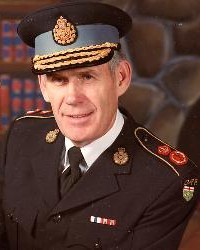
Archie Ferguson
was one of twelve Inspectors in the Criminal Investigation Branch (CIB). In 1969, Inspector Ferguson was assigned to the investigation of the crime scene of Mary Nelles, kidnapped daughter of Toronto businessman Marshall Davis.
1971 -- In Kingston Penitentiary, a riot broke out with inmates brutally assaulting other inmates. CIB assigned Chief Inspector Ferguson to investigate the murders of two inmates.
February 1982 -- he was promoted to the rank of Deputy Commissioner.
October 1, 1983 -- Robert Archie Ferguson was appointed the ninth Commissioner of the OPP.
1971 -- In Kingston Penitentiary, a riot broke out with inmates brutally assaulting other inmates. CIB assigned Chief Inspector Ferguson to investigate the murders of two inmates.
February 1982 -- he was promoted to the rank of Deputy Commissioner.
October 1, 1983 -- Robert Archie Ferguson was appointed the ninth Commissioner of the OPP.
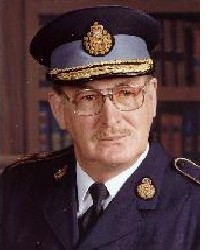
J.L. (James) Erskine
was born in Guelph, Ontario, on September 8, 1920. He was married to Jeanette, and had four sons, Danny who was a Senior Constable with the OPP and now deceased, Bruce, Rick and Barry.
During the Second World War, he served overseas with 405 Squadron of the Royal Canadian Air Force. On September 17, 1945, he was appointed to the OPP as a probationary constable, shortly after his release from the services, and, on January 3, 1946, was posted to No. 4 District Headquarters in Niagara Falls. In June 1953, he was promoted to Corporal and transferred to St. Catharines, where he served until June 1960, when he was promoted to the rank of Inspector and transferred to the Criminal Investigations Branch.
James Erskine headed the new Anti-Rackets Squad from its formation in 1960, and gained a considerable reputation following his investigation of the fraudulent sales of counterfeit works of art in 1963. He was promoted to Chief Inspector in 1965, to Staff Superintendent in 1968, and to the rank of Chief Superintendent in 1970. In December 1972, he served as head of the Special Services Division and later commanded the Field Division before being made a Deputy Commissioner in 1975.
In that year, he played a major part in the hostage-taking incident near Thamesford where he was successful in gaining the release of the captive children. In 1976, James Erskine served as President of the Quarter Century Club, following the footsteps of Commissioners Stringer, Silk and Graham. In 1978, he was elected President of the Ontario Association of Chiefs of Police, the first time in the 27-year history of the Association that a member of the OPP had been so honoured. From September 25, 1981 to September 30, 1983, Commissioner Erskine served as the Commissioner of the OPP. In 1981, Deputy Commissioner Erskine was appointed President of the Royal Canadian Military Institute. He was a graduate of public administration at the University of Toronto and, also, served as chairman of the Ontario Traffic Safety Council. He served as Executive Director of the International Association of Chiefs of Police, and was a member of the Canadian Association of Chiefs of Police. On September 30, 1983, following his term, Commissioner Erskine left the OPP to head a new special government unit to combat problems related to drinking and driving. He acted as Honorary Colonel of the 11th Field Artillery Regiment located in Guelph. A 1988 30' Hike vessel was put into service on June 16, 1988, and assigned to the then Midland Detachment. It was christened J.L. Erskine. It is presently serving at the North Bay Detachment.
During the Second World War, he served overseas with 405 Squadron of the Royal Canadian Air Force. On September 17, 1945, he was appointed to the OPP as a probationary constable, shortly after his release from the services, and, on January 3, 1946, was posted to No. 4 District Headquarters in Niagara Falls. In June 1953, he was promoted to Corporal and transferred to St. Catharines, where he served until June 1960, when he was promoted to the rank of Inspector and transferred to the Criminal Investigations Branch.
James Erskine headed the new Anti-Rackets Squad from its formation in 1960, and gained a considerable reputation following his investigation of the fraudulent sales of counterfeit works of art in 1963. He was promoted to Chief Inspector in 1965, to Staff Superintendent in 1968, and to the rank of Chief Superintendent in 1970. In December 1972, he served as head of the Special Services Division and later commanded the Field Division before being made a Deputy Commissioner in 1975.
In that year, he played a major part in the hostage-taking incident near Thamesford where he was successful in gaining the release of the captive children. In 1976, James Erskine served as President of the Quarter Century Club, following the footsteps of Commissioners Stringer, Silk and Graham. In 1978, he was elected President of the Ontario Association of Chiefs of Police, the first time in the 27-year history of the Association that a member of the OPP had been so honoured. From September 25, 1981 to September 30, 1983, Commissioner Erskine served as the Commissioner of the OPP. In 1981, Deputy Commissioner Erskine was appointed President of the Royal Canadian Military Institute. He was a graduate of public administration at the University of Toronto and, also, served as chairman of the Ontario Traffic Safety Council. He served as Executive Director of the International Association of Chiefs of Police, and was a member of the Canadian Association of Chiefs of Police. On September 30, 1983, following his term, Commissioner Erskine left the OPP to head a new special government unit to combat problems related to drinking and driving. He acted as Honorary Colonel of the 11th Field Artillery Regiment located in Guelph. A 1988 30' Hike vessel was put into service on June 16, 1988, and assigned to the then Midland Detachment. It was christened J.L. Erskine. It is presently serving at the North Bay Detachment.
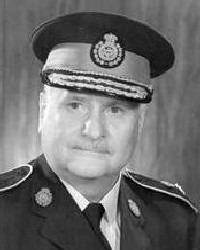
H.H. Graham
, as he was commonly known throughout his 41-year OPP career, joined the provincial police on Jan. 1, 1941 at age 25 and was first posted to London. A year later he was transferred to Sarnia where he served for eight years. In 1949, he was promoted to Inspector and transferred to OPP Criminal Investigation Branch (CIB) at General Headquarters in Toronto. At the age of 33 he had the distinction of being the youngest CIB Inspector on the force. Graham became Chief Inspector of CIB in 1961 and two years later was named Assistant Commissioner of the newly formed Special Services Division. He was promoted to Deputy Commissioner of Operations in 1971. In 1973, he became the eighth Commissioner of the Ontario Provincial Police.
Commissioner Graham led the force through eight years of continual evolution. In a tribute published at the time of his retirement, Commissioner Graham was recognized for having guided the force to a position of influence within the police community. Under his leadership, "the OPP did more than keep pace with the times, it provided a standard of excellence sought by many forces."
Among his police credentials, Commissioner Graham was a member of the International, Canadian and Ontario Associations of Chiefs of Police and an early graduate of Harvard Associates in Police Science. He was also a president of the Ontario Public Service Quarter Century Club, a recipient of the Canadian Centennial Medal, a commander in the Order of St. John, and a knight in the Military and Hospitaller Order of Saint Lazarus of Jerusalem.
Commissioner Graham led the force through eight years of continual evolution. In a tribute published at the time of his retirement, Commissioner Graham was recognized for having guided the force to a position of influence within the police community. Under his leadership, "the OPP did more than keep pace with the times, it provided a standard of excellence sought by many forces."
Among his police credentials, Commissioner Graham was a member of the International, Canadian and Ontario Associations of Chiefs of Police and an early graduate of Harvard Associates in Police Science. He was also a president of the Ontario Public Service Quarter Century Club, a recipient of the Canadian Centennial Medal, a commander in the Order of St. John, and a knight in the Military and Hospitaller Order of Saint Lazarus of Jerusalem.
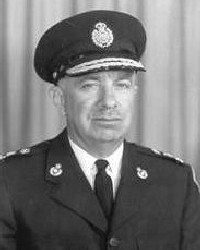
Eric Silk
served as the sixth Commissioner of the Ontario Provincial Police (OPP). He immediately initiated a major re-organization of the OPP. This resulted in a new command structure. Within the same year, Commissioner Silk introduced a performance rating system that resulted in increased accountability and recognition of all personnel.
In 1965, Commissioner Silk continued to introduce valuable and important changes to the OPP, which included various training opportunities:
- Formed specialized teams that included training self-contained underwater breathing apparatus (scuba) divers as well as training in the handling of explosive devices; and,
- Raised professional standards within the OPP by offering several specialized courses at the OPP College as well as initiating specialized courses through In Service Training programs.
In 1966, a new promotional program was introduced along with a cadet program that allowed persons of at least 18 years of age to a maximum of 21, to apply if interested in pursuing a career in policing.
Over the next several years, additional changes were made that would benefit the OPP, even today:
Commissioner Silk was instrumental in the designation of the "Commissioned" officer through the award of the "Queen's Commission". OPP funding was reduced and it appeared the OPP Auxiliary Program would be eliminated. Commissioner Silk secured the necessary funding to retain the program and, in May 1967, the OPP Auxiliary was declared the best unit in the "Parade of Nations" at the World Congress of Police Officers.
Commissioner Silk retired on February 28, 1973, after serving ten years with the OPP. During his ten years as Commissioner of the OPP, Commissioner Silk greatly improved the morale of the force and initiated sweeping organizational changes, which improved the professionalism of the OPP.
In 1965, Commissioner Silk continued to introduce valuable and important changes to the OPP, which included various training opportunities:
- Formed specialized teams that included training self-contained underwater breathing apparatus (scuba) divers as well as training in the handling of explosive devices; and,
- Raised professional standards within the OPP by offering several specialized courses at the OPP College as well as initiating specialized courses through In Service Training programs.
In 1966, a new promotional program was introduced along with a cadet program that allowed persons of at least 18 years of age to a maximum of 21, to apply if interested in pursuing a career in policing.
Over the next several years, additional changes were made that would benefit the OPP, even today:
- - A drive to hire bilingual recruits was launched;
- - Crowd and riot control training was offered to OPP members;
- - The Pipes and Drums band was beginning to form with a uniform designed specifically for the band's use;
- - Trevor the OPP Traffic Bug was introduced to raise awareness of public safety messages;
- - The marine unit was expanded;
- - Additional snowmobiles were acquired to assist in travelling to remote areas;
- - Motorcycle patrols were re-introduced, which included the Motorcycle Precision Ride Team (Golden Helmets), to perform at special events;
- - Law enforcement by air was introduced to the OPP;
- - The OPP Review, a Force periodical, was produced;
- - Commissioner Silk was instrumental in redesigning the uniform to fit the changing seasons; and,
- - Commissioner Silk designed the OPP crest, which remains today. He was also responsible for promoting the use of the acronym "OPP".
Commissioner Silk was instrumental in the designation of the "Commissioned" officer through the award of the "Queen's Commission". OPP funding was reduced and it appeared the OPP Auxiliary Program would be eliminated. Commissioner Silk secured the necessary funding to retain the program and, in May 1967, the OPP Auxiliary was declared the best unit in the "Parade of Nations" at the World Congress of Police Officers.
Commissioner Silk retired on February 28, 1973, after serving ten years with the OPP. During his ten years as Commissioner of the OPP, Commissioner Silk greatly improved the morale of the force and initiated sweeping organizational changes, which improved the professionalism of the OPP.



.jpg)



.png)
